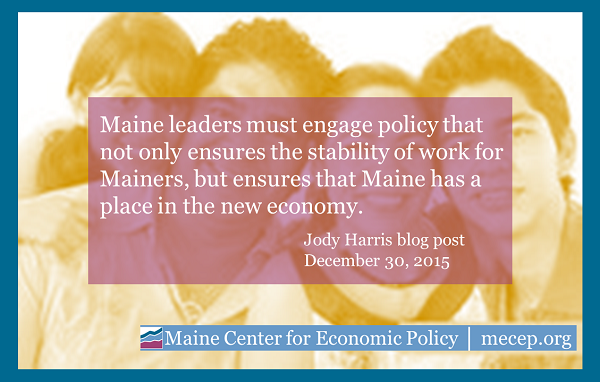As if employment opportunities for low-income workers weren’t bleak enough―low-wages, no retirement savings, no health insurance―now these workers face a complete breakdown of the traditional employer-employee relationship that historically provided for safe working conditions, income protections, and economic security.
Nearly 33% of Maine working families are low-income. That means 40,000 Maine households with at least one child have at least one member who is working and yet still do not earn enough to keep their families fed, clothed, and warm. Low income Mainers often work part-time, hold more than one job, and lack the family and student supports to go back to college.
 These days many low-income workers are part of the “sharing economy.” Sharing or “gig” economy jobs rely on technology or “sharing platforms” to serve customers. Best known are Uber (transportation/
These days many low-income workers are part of the “sharing economy.” Sharing or “gig” economy jobs rely on technology or “sharing platforms” to serve customers. Best known are Uber (transportation/
taxi) and Airbnb (lodging). But sharing jobs have grown to include administrative assistants, house cleaning, on-demand grocery-shopping, and more.
A new report by the Working Poor Families Project describes the sharing economy as one more in a long line of big business attacks on worker rights and protections. In the last decades, employers outsourcing labor, reducing jobs to part-time, eliminating benefits, moving operations overseas, and replacing permanent employees with temporary or “contingent” workers have threatened the “economic foundation and security of working families, communities, and entire regions.”
The sharing economy fundamentally changes the nature of the workplace. Workers are no longer employees. They have no protections and no benefits and they absorb all the business risk without benefiting from the profit.
State policies can safeguard workers from these precarious work arrangements. Some of these policies ripe for adoption in Maine include:
- Raise the minimum wage.
- Protect workers who ask for predictable schedules from employer retaliation.
- Establish worker standards for companies that receive state funds.
- Adopt state paid family and medical leave and paid sick days policies.
- Accept federal Affordable Care Act funds to expand MaineCare.
- Offer portable, state-based retirement programs with automatic enrollment through payroll deduction.
- Provide training and financial incentives for public benefit corporations.
- Expand and fund training and education programs for low-income workers to improve skills and pursue better jobs.
- Apply core state labor and employment protections to all workers no matter their employment classification.
Ample solutions are available to address the gaps in worker rights and protections that the sharing economy presents, and states and cities across the nation have begun adopting these policies. Maine leaders must engage policy that not only ensures the stability of work for Mainers, but ensures that Maine has a place in the new economy. Maine legislators, business and community leaders, workers’ rights supporters, and advocates for low-income working families must be forward-thinking enough to embrace these policies and courageous enough to adopt them.



